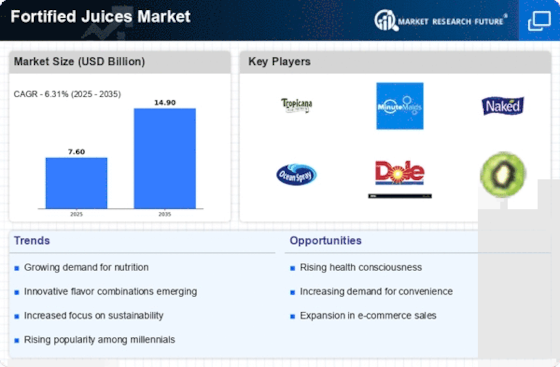Top Industry Leaders in the Fortified Juices Market

Strategies Adopted by Fortified Juices Key Players
The fortified juices market has experienced substantial growth in recent years, driven by increasing consumer awareness regarding the health benefits associated with fortified beverages. As consumer preferences shift towards healthier alternatives, key players in the industry have been implementing various strategies to maintain a competitive edge. The competitive landscape is marked by the presence of established companies and the emergence of new players, all vying for a share of the growing market.
Key Players:
PepsiCo Inc. (US)
Hain Celestial (US)
Evolution Fresh (US)
Sudzucker AG (Germany)
SunOpta
Inc. (Canada)
Diana Naturals (France)
Doehler Group (Germany)
The Coca-Cola Company (US)
MARIGOLD (Singapore)
and Welch Foods Inc. (US)
The fortified juices market adopt various strategies to stay competitive. Product innovation is a primary focus, with companies continually introducing new flavors and formulations to cater to evolving consumer preferences. Strategic partnerships with suppliers and retailers help expand market reach, ensuring that fortified juice products are readily available to consumers. Additionally, marketing and advertising efforts play a crucial role in creating brand awareness and emphasizing the nutritional benefits of fortified juices, driving consumer adoption.
Market Share Analysis:
The fortified juices segment involves considering several key factors. Brand recognition and consumer loyalty are critical determinants, as consumers often gravitate towards well-established and trusted brands. Distribution channels and partnerships with retailers also play a significant role, ensuring that products are accessible to consumers across various geographic regions. Pricing strategies, along with competitive positioning in terms of taste and nutritional content, contribute significantly to market share dynamics in the fortified juices sector.
News & Emerging Companies:
The fortified juices market has witnessed the entry of new players seeking to tap into the growing demand for healthier beverage options. Start-ups such as NutriDrinks and FreshWell Beverages have emerged, introducing innovative fortified juice products with unique formulations. These emerging companies aim to disrupt the market by offering healthier alternatives to traditional fruit juices, challenging established players and contributing to the overall diversification of the fortified juices segment.
Industry Trends:
The fortified juices market reflect the evolving landscape of consumer preferences and health-conscious choices. Key players are actively investing in research and development to create products that align with current health and wellness trends. Investments in sustainable packaging solutions are gaining traction as consumers increasingly value environmentally friendly choices. Companies are also exploring digital marketing strategies and e-commerce channels to enhance their market reach, reflecting the shift in consumer shopping behaviors.
Competitive Scenario:
The fortified juices market is dynamic, with companies continuously adapting to changing consumer preferences and market trends. The emphasis on healthier lifestyles has driven competition towards creating products that not only taste good but also offer functional health benefits. The battle for shelf space in supermarkets and online platforms further intensifies the competitive landscape, prompting companies to differentiate themselves through marketing and branding initiatives. In addition, the ability to adapt quickly to emerging trends and consumer demands remains a crucial factor for sustained success in this competitive environment.
Recent Development
The fortified juices market experienced several notable developments. The Coca-Cola Company launched a new line of fortified fruit blends, targeting consumers looking for refreshing beverages with added nutritional benefits. PepsiCo introduced a range of fortified smoothies under the Tropicana brand, aiming to capture a larger share of the health-conscious consumer market. Nestle expanded its fortified juice offerings with variants focusing on immune support and hydration, aligning with prevalent health trends.
Danone made headlines with its acquisition of a regional fruit juice company, enhancing its product portfolio and market presence in specific geographic areas. Ocean Spray Cranberries Inc. invested in sustainable sourcing practices for its fruit ingredients, reflecting a commitment to environmentally responsible business operations. These developments underscore the competitive nature of the fortified juices market, with companies striving to innovate and meet evolving consumer expectations to secure their positions in this rapidly growing industry.











